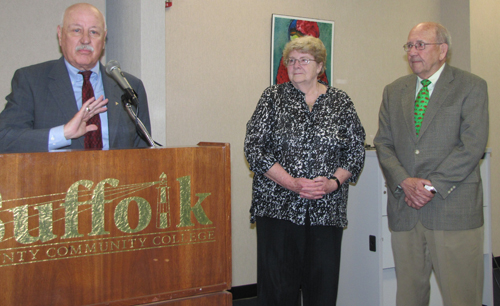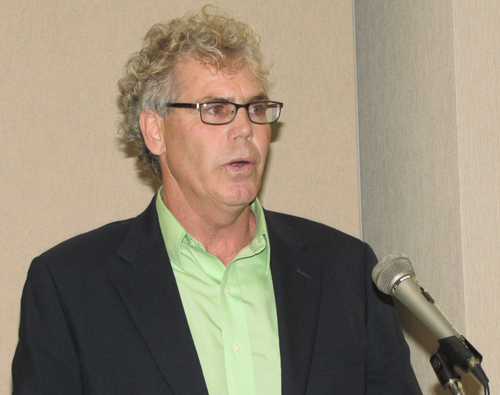Conklin, Miller named North Fork ‘Environmental Champions’

The late Bob Conklin of Flanders and Jim Miller of Southold were honored as “Environmental Champions” by the North Fork Environmental Council on Thursday for their work establishing a fish passage at Grangebel Park.
The rock passage allows alewives and other fish to migrate from fresh to salt water, where they become food for other larger species like fluke, weakfish and striped bass.
Also honored was Kevin McAllister, the Peconic Baykeeper for the past 15 years, who received the “Richard Noncarrow Environmentalist of the Year” award.
The awards were handed out at the Suffolk Community College culinary school in downtown Riverhead.
The Peconic River, like many rivers in the late 1800s and early 1900s, was dammed up in spots to provide power for mills and other uses, cutting off the alewives’ migratory routes, which spawn in fresh water and migrate to salt water.
Mr. Conklin, a science teacher at Riverhead High School, initially would take his students down to the river to carry the alewives over the dam using nets.
But since this solution could only help a limited number of fish, Mr. Conklin in 2000 sought out the help of Mr. Miller, an environmental engineer and the founder of Miller Environmental in Calverton.
Mr. Miller helped set up an Alaskan Steep Pass, which was commonly called a fish ladder, and which helped the fish migrate over the dam from fresh water to salt water and back. But the fish ladder was only a temporary structure.
After a few years, they embarked on a plans to establish a permanent fish passage system at the Grangebel dam.
That system, which was aided by state and federal grants obtained by Riverhead Town, was completed in early 2011, just months after Mr. Conklin died in December 2010.
An estimated 50,000 to 70,000 alewives pass through the rock passageways, officials says. Eels also use the passageway.
The efforts of Mr. Conklin and others were featured on an episode of the television show, Lunkerville, in 2012, and that segment was shown Thursday night.
“It has reached a magnitude beyond our belief,” Mr. Miller said in the video. “We had fantasized that maybe some tens of thousand of fish could possibly migrate. We are now of the belief that it’s hundreds of thousands. As they migrate out into the bay, they become primary foraging fish for the striped bass, the fluke and the weakfish, and those fish migrate out into the ocean, and the sharks and tuna will feed off the blue fish.
“It could actually impact the entire fisheries on the east coast of the United States.”
Mr. Conklin’s award was presented posthumously to his wife Joyce. She and Mr. Miller also were given proclamations by a number of elected officials.
Mr. Miller said Tim Griffing and Byron Young also should be recognized for their efforts in creating the fish passage. George Bartunek, who worked on the fish passage, said this was what Mr. Conklin loved to do.

Mr. McAllister works for a private non-profit environmental organization called Peconic BayKeeper.
“He’s a man who has made a dramatic impact on our waterways,” said State Senator Ken LaValle (R-Port Jefferson), who said Mr. McAllister has highlighted the damage done to waterways by cesspools, and helped bring that issue to the forefront.
“The Peconic Bay is a resource people believed was infinite and no matter what we did to it, it would be still be there,” said South Fork state Assemblyman Fred Thiele (I-Sag Harbor). “We’ve found out now that is not the case.”
NFEC president Bill Toedter said Mr. McAllister has highlighted the fact that “what we do on land determines what happens with our waters.”








